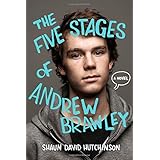Hutchinson, Shaun David. The Five Stages of Andrew Brawley. New York: Simon Pulse, 2015. Print.
image from: www.amazon.com

My Thoughts
from the inside jacket:
"Andrew Brawley was supposed to die that night. His parents did, and so did his sister, but he survived. Now he lives in the hospital. He serves food in the cafeteria, he hangs out with the nurses, and he sleeps in a forgotten supply closet. Drew blends in to near invisibility, hiding from his past, his guilt, and those who are trying to find him."
This story sounded very interesting to me. What happened to his family? How does a kid live in a hospital undetected? How does he work in the cafeteria? Who is trying to find him?
The first line of the book is "The boy is on fire" (Hutchinson 1). A patient comes in with severe burns, and Drew sees him from where he's hiding. Drew also hears the "animal howls" and has "nowhere in this hospital that I could hide to escape his screams" (Hutchinson 2). Some kids doused the boy with alcohol and lit him on fire (Hutchinson 16). Drew visits him in the ICU by sneaking in and finds out the patient's name is Rusty McHale (Hutchinson 18). Drew borrows books from his boss in the cafeteria and reads to Rusty. Drew even confesses what happened to his own family (This happens over multiple secret visits.) and makes the promise that Death will not find Rusty. Drew will protect him. After Rusty begins to recover some from his burn injuries and is awake, Drew and Rusty become friends and eventually kiss (a few times).
Drew also visits "Grandma" Brawley. I really like this character, even though it appears she's in a coma. "I tell Grandma Brawley everything. She's a vault. Best secret keeper ever" (Hutchinson 41). All of the nurses believe that Andrew is her grandson and gush how he visits her when no one else does. Drew has even created a fiction of her life story, complete with a tragic lost love element.
Lexi & Trevor who are in the Peds floor, both with cancer. These two become good friends with Drew. Their story weaves nicely with Drew's, and I appreciate their honestly among friends. I was surprised at how the book ended for them. (no spoiler alerts here)
I like that Death (notice the capital letter) "follows" Andrew. Drew's description of Death is clever. "The thing about Death is that's she's predictable. She eats every morning at seven thirty....Death never leaves. Death lives her. She's married to her job" (Hutchinson 65). "Death" is actually a social worker named Michelle (Hutchinson 70). However, the reader can see that Drew has studied and observed her and even fears her, as in his mind, this women personifies death and the loss of his family.
Father Mike plays a pivotal role in the story, although when first introduced, he seemed to be a minor character. "Father Mike's got these blue eyes like I've never seen before. They're flashlights, shining their holy light into corners of my soul that I don't necessarily want illuminated" (Hutchinson 102). Father Mike symbolizes the moral compass that Drew seeks. Father Mike also gives sound advice. "In order for a hero to be a true hero, he's got to have something worth living for. He's got to love something" (Hutchinson 121). Is Father Mike talking about Drew or the comic book character, Patient F?
By the way, there is a comic book story that Drew creates inserted into his own story. The main character, Patient F, is a hero (or not). His story changes and the last "installment" of the book becomes the epilogue (at least as Drew wishes it to be the journey of his life).
After finishing the book, I'm not sure I understand the "stages" of Andrew. I see some transitions, but I guess I missed what is considered a "stage." I understand that Drew felt he should be punished and must stay at the hospital. I get that Rusty gave him a reason to live (just as Drew gave and took away Rusty's reason). I just don't know if I can classify the "stages" as the title indicates there are.
I liked that the characters, actions, explanations and events were not all as they seemed. Several times in the book I was surprised by what happened or what truths were exposed. I kept thinking about Paul Laurence Dunbar's poem "We Wear the Mask."
As this book is being touted for LGBT audiences, I thought I should read it before putting it out on the shelves. There are a few labels used (queer, gay dude, pervert, cock gobbler). There is mention of relationships between boys (kissing, boyfriend). I like that Hutchinson discusses bullying in this story, but then I am saddened because I know that his commentary is pretty accurate. "While his parents and the doctors and the principal all tell him that he's going back, that he's going to be safe, even thought they all laugh behind their hands with the knowledge that the bullies will get him, beat him, before the end of day one" (Hutchinson 257). Bullies are hard to stop.
No comments:
Post a Comment